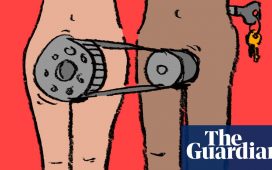The other day, in a moment befitting the tenor of 2021, I felt overwhelmed. At that moment, it wasn’t the fear of another lockdown or the slow pace of the vaccine rollout that was bothering me, but an awareness of a distinct kind of intrusion into my day: other people’s advice. I was sick of commentators, prognosticators, snake oil salesmen and pundits – some with dubious qualifications – telling me how to live.
This is not entirely their fault. After all, these are the books, podcasts, commentary and documentaries I had signed up for, purchased and scrolled/half-read in the hope of increased enlightenment. And yet I felt drained by the number of people offering their take on wine pairings, how to handle difficult co-workers, the best stretches to cure lower back pain, and why creative writing is like a shy snow leopard that must be coaxed gently from its den (by reading this 10-step guide).
Because aren’t we all a bit sick of other people’s solutions?
Recently I did an informal advice audit of my day and discovered that there are very few aspects of my existence that are not subject to advice of some persuasion. In the space of 24 hours, people I had never met told me how to sleep, how to sit, how to walk, what to eat, when to eat, whom to love, how to buy a property, how to write an email, how to bid at auction, how to raise kids, how to decide whether to have kids, how to ward off cancer, how to know if I was clenching my jaw at night, how to live to 100 (stay positive!) and even how to breathe. My daily evening walks, a hangover from lockdown days, are now stuffed with self-optimising podcasts identifying the right books to read, the best way to approach my career, and how to think about thinking.
Naturally, in its vastness, this great industrial advice complex has sprouted a couple of spin-off cottage industries. The first is made up of what I think of as professional advice debunkers: self-appointed contrarians who build careers by dispelling popular wisdom. The second is a cadre of anti-advice pundits who promote the magic of ignoring the madding crowd, of shunning advice altogether, to chart our own unique journey of inner growth. You do you!
A decade ago, we used to complain of information overload, but lately, it has felt as if information is precisely what is needed to hold back the tide of advice that floods us.
To head online, to log on to Facebook or Instagram, is to be offered advice or solutions that you didn’t realise you needed. As Shoshana Zuboff writes in The Age of Surveillance Capitalism: The Fight for a Human Future at the New Frontier of Power, our habits and behaviours are the new natural resources to be mined for profit. What we need advice on – our potential search queries – are big business to the advertisers who rely on access to our behavioural whims or what Zuboff refers to as “the behavioural futures markets”. These days, it’s become hard to discern whether you are reading advice because you need a problem solved or if you have been convinced there is a problem you didn’t realise you had and so are searching for a solution to an amorphous affliction that may or may not be real. The result is one hugely profitable cycle of problem-creation and click-bait solution.
Our individuality is lost when our solutions come from strangers who cannot possibly fathom our personal circumstances or react to the nuance of our unique background and set of fears. Things get diabolical when that stranger is an algorithm and your question is fed into a search engine.
Which is surely where our friends come in. But have you tried to get frank feedback from a friend these days? It’s hard to come by. Not only are my friends ridiculously nice people but it’s unfashionable to be up-front or prescriptive. Everyone considers each other’s feelings, which is all well and good, but where does that leave me on the issue of whether I need to start doing weight-bearing exercises to beat the advancing years?
The real issue I suspect, and the main reason I need to dial down the advice of strangers, is that I do not want all of my problems to be guessed at and solved. The idea that my purpose in life is to hit milestone after milestone, on a relentless path of growth, disease-prevention and self-awareness, is the kind of hubris that starts one googling weird queries in the first place.
So, instead, I am going to let my deeply human (and imperfect) self move more freely through the world without entertaining the feedback loop in my brain of things I could be improving or acting upon.
And if I am ever truly broken, if I ever need advice about a genuine and pressing issue, I will head to a professional, someone I can interact with. The rest is just noise.














